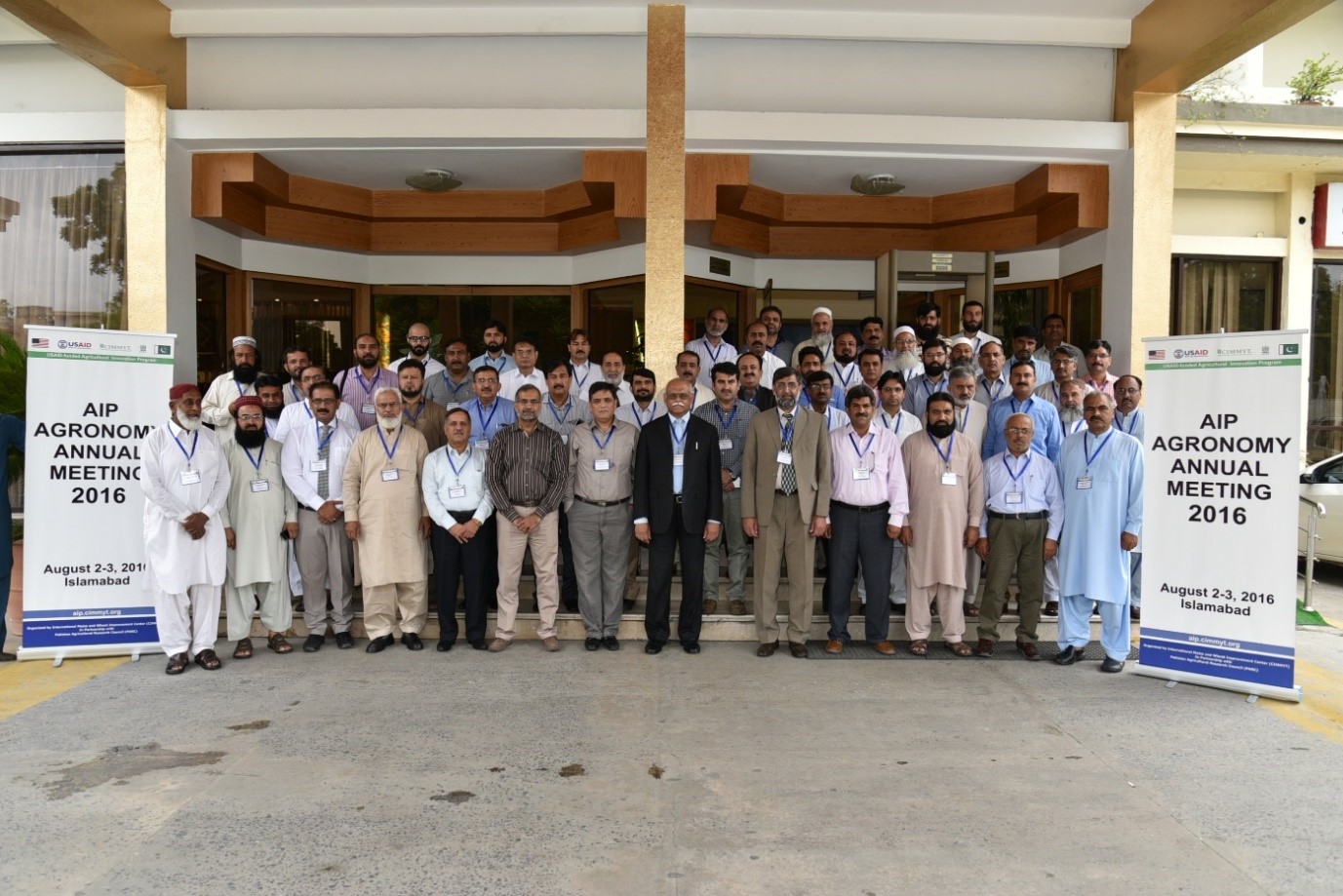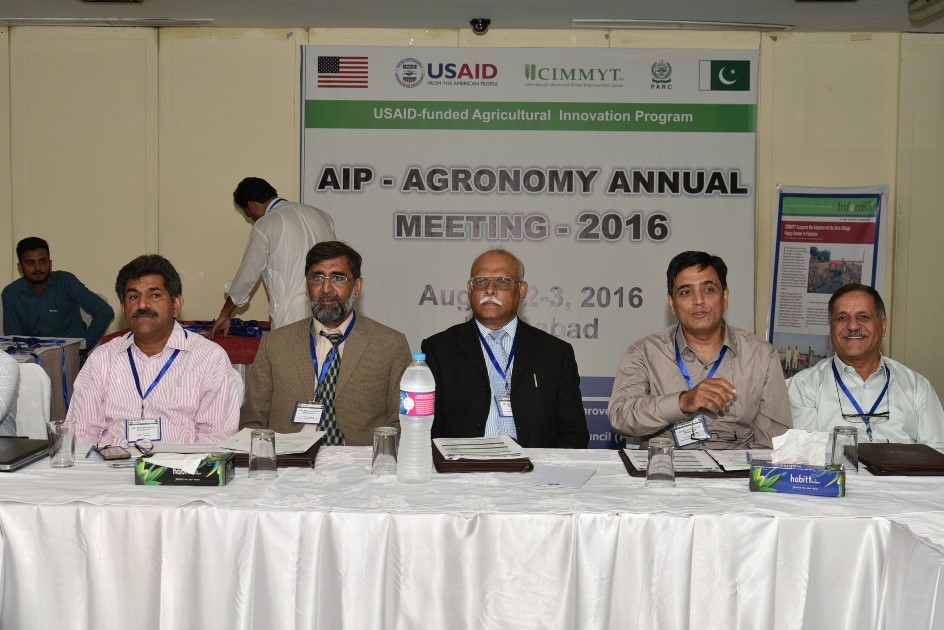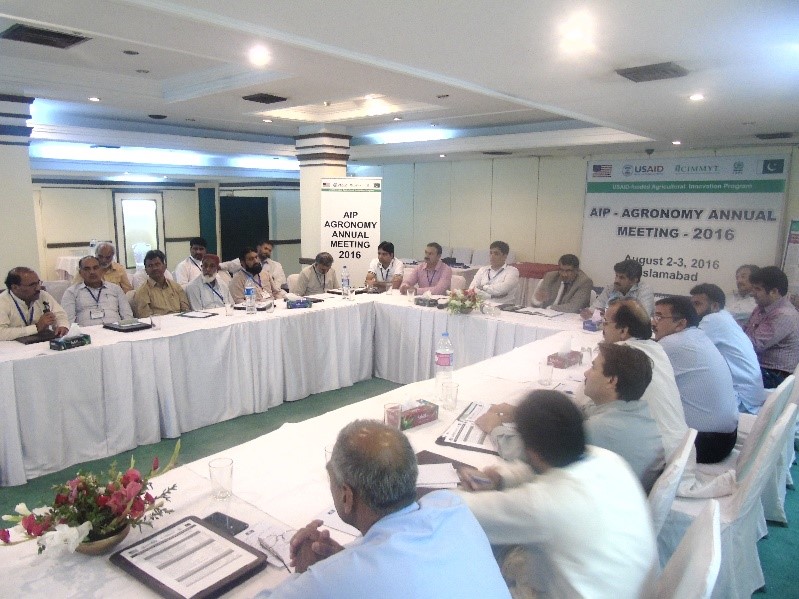
ISLAMABAD, Pakistan (CIMMYT) — “I believe that crop management technologies can only be transferred to farmers with the active involvement of public, private sector and farmers,” said Nadeem Amjad, Chairman of the Pakistan Agricultural Research Council (PARC) at the inaugural session of the Agricultural Innovation Program (AIP) Agronomy’s annual meeting held in Islamabad, Pakistan, on 2-3 August 2016. He acknowledged the efforts of CIMMYT and its national partners in developing and disseminating crop management techniques to the country’s farming community.
The meeting was jointly organized by CIMMYT and PARC under USAID’s AIP for Pakistan. Agriculture professionals belonging to 23 national partner institutions shared progress on AIP’s agronomy activities, and discussed implementation-related issues and future activities. The inaugural session was attended by 60 agriculture professionals from various provincial and federal research institutes, agriculture extension services, universities, private companies and international research centers, who are involved in agronomy research and in disseminating conservation agriculture (CA) technologies among the farming community under AIP.

On this occasion, PARC Member Ahmed Bakhsh Mahar welcomed meeting participants and said the meeting was a forum where all stakeholders could review AIP’s progress, discuss issues and future plans, and share their experiences.
CIMMYT Country Representative and AIP Project Leader Imtiaz Muhammad informed participants that 23 national public and private sector partners are collaborating on disseminating crop management practices in 42 districts of the country under USAID-funded AIP for Pakistan. CIMMYT is also collaborating with agricultural machinery manufacturers to locally produce new planters that have already been tested in the country.
Imtiaz Hussain, Cropping System Agronomist, apprised the participants that conservation agriculture techniques such as zero-tillage wheat, ridge planting of wheat; new seeders like the zero-till Happy Seeders, push row planters, multicrop zero-till planters and nutrient management techniques have been disseminated to more than 7500 Pakistani farmers through 1000 on-farm demonstrations, 22 training courses and 78 farmer days. AIP Agronomy also facilitated training of 131 staff members of partner institutions and helped train more than 800 farmers and support staff in the project area.

After successfully evaluating them, CIMMYT initiated local production of the zero-tillage Happy Seeder for wheat planting on combine harvested rice fields in Punjab, a multicrop planter for direct seeding rice and a push row planter for planting maize. As part of the collaboration with local machine manufacturers, Greenland Engineers and Petal Seeds provided 32 multicrop zero-till planters and 30 push row planters, respectively, to farmers in the project area. CIMMYT, in collaboration with national partners, has also focused on evaluating site-specific nutrient management techniques, such as a leaf color chart in rice and the handheld Green Seeker sensor for nitrogen management in wheat.
National partners agreed that AIP would focus on building the capacity of farmers and service providers in improved technologies, providing the Green Seeker to national partners, and manufacturing and disseminating new seeders like the lightweight Happy Seeder and push row planter.
When closing the AIP Agronomy annual meeting, NARC DG Muhammad Azeem Khan said that crop productivity in Pakistan can be improved significantly by focusing on crop management. He also stressed that efforts should focus more on training service providers and on providing implements for CA sustainability. He proposed developing a database on the adoption of CA techniques in the country and establishing CA working group.
 Capacity development
Capacity development 
